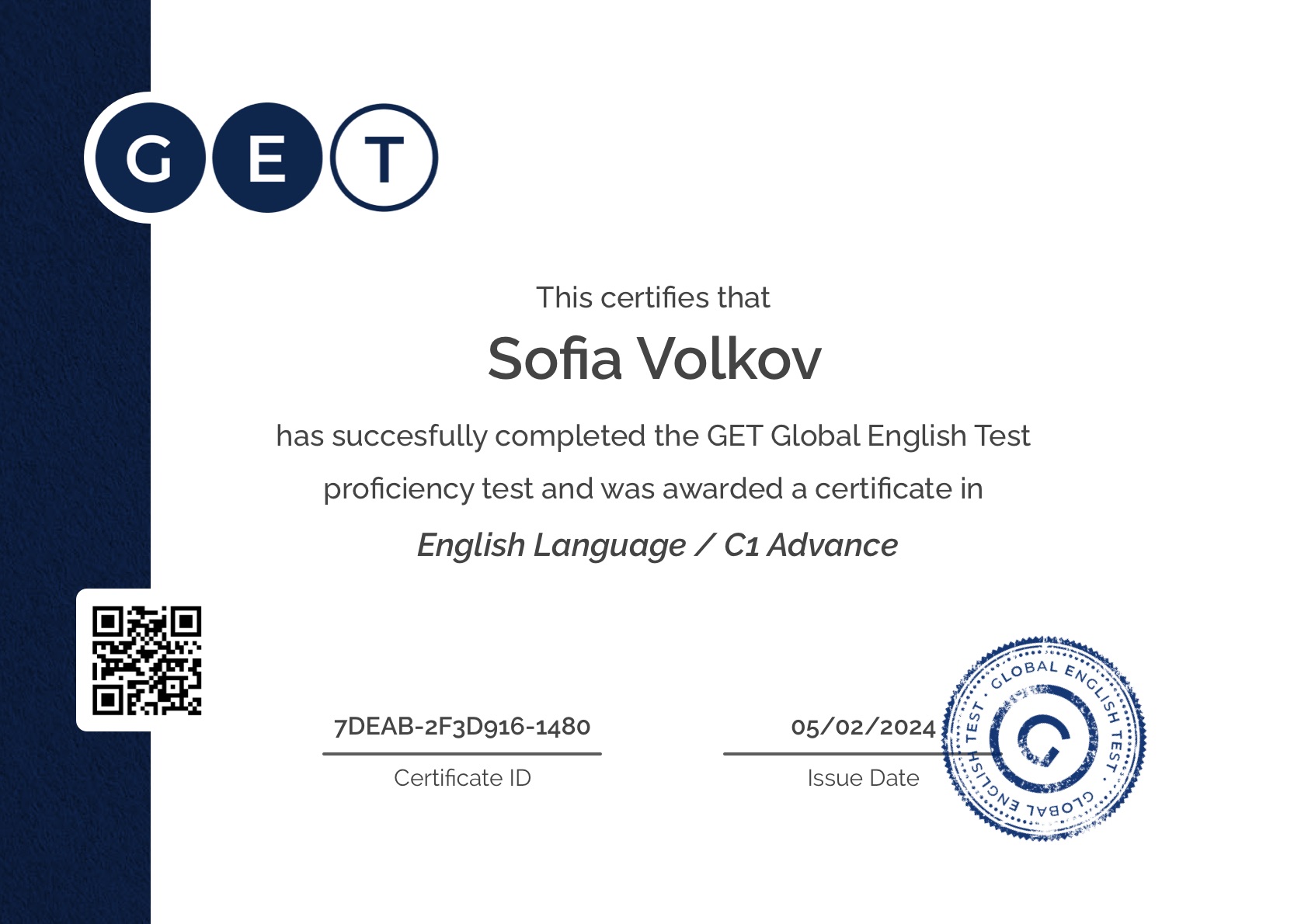
C1 English Level (Advance)
The C1 English level, commonly referred to as “Advanced,” represents a high level of language proficiency where individuals have near-native competence in English. Here are some key characteristics of the C1 English level:
-
Express themselves fluently and spontaneously
-
Able to write clear, well-structured, detailed text on complex subjects
-
Understand long and complex factual and literary texts, appreciating distinctions of style
What is C1 English Level (Advance)?
The C1 English level, also known as “Advanced” proficiency, is a designation used in language assessment frameworks like the Common European Framework of Reference for Languages (CEFR). It signifies a high level of competence in the English language. Here’s a breakdown of what it typically entails.

Key characteristics of the C1 English level (Advance):
Speaking Skills
Individuals at the C1 level can engage in fluent, spontaneous, and nuanced conversations on a wide range of topics. They can express themselves with precision, clarity, and sophistication, using a wide range of vocabulary and idiomatic expressions.
Listening Skills
They can understand spoken English in a variety of contexts, including formal presentations, academic lectures, radio broadcasts, and natural conversations among native speakers. They can grasp complex ideas, understand implicit meanings, and follow intricate arguments with ease.
Reading Skills
They can read and understand a wide range of complex texts, including academic articles, literary works, technical manuals, and specialized reports. They can comprehend detailed information, analyze arguments and viewpoints, and critically evaluate the content of the text.
Writing Skills
They can produce clear, well-structured, and coherent texts on a variety of topics, ranging from formal essays and research papers to creative writing and professional correspondence. Besides, they can convey complex ideas, argue persuasively, and adapt their writing style to different audiences and purposes.
Grammar and Vocabulary
They have a sophisticated command of grammar and can use a wide range of grammatical structures accurately and appropriately. They also possess an extensive vocabulary, including idiomatic expressions, collocations, and nuanced language, allowing them to express themselves with precision and fluency.
Proficiency in Academic and Professional Contexts
They can participate effectively in academic discussions, debates, and presentations, as well as professional meetings, negotiations, and conferences. They are able to communicate complex ideas, collaborate with others, and contribute meaningfully to discussions and projects.
Overall, individuals at the C1 English level have achieved a high level of language proficiency. They can communicate fluently, accurately, and confidently in English across a wide range of contexts and situations.
Test your English level now
Answer 40 questions and find out your English language level comfortably.

An A1 English Level Certificate. Start the test to get yours now!
Listen to a C1 English Level Speaker
Play the audio recording below to listen to an example of a conversation by someone speaking English at a C1 level.

What can C1 English Level (Advance) Do?
Individuals at the C1 English level, also known as “Advanced,” possess a high level of language proficiency and can perform a variety of tasks with near-native competence. Here are some key abilities and tasks that someone at the C1 level can typically accomplish:
Engage in Fluent Conversations
They can engage in fluent, spontaneous, and nuanced conversations on a wide range of topics. They can express themselves with precision, clarity, and sophistication, using a wide range of vocabulary and idiomatic expressions.
Understand Complex Spoken English
They can understand spoken English in a variety of contexts, including formal presentations, academic lectures, radio broadcasts, and natural conversations among native speakers. They can grasp complex ideas, understand implicit meanings, and follow intricate arguments with ease.
Read and Analyze Complex Texts
They can read and understand a wide range of complex texts, including academic articles, literary works, technical manuals, and specialized reports. They can comprehend detailed information, analyze arguments and viewpoints, and critically evaluate the content of the text.
Write Coherent and Persuasive Texts
They can produce clear, well-structured, and coherent texts on a variety of topics, ranging from formal essays and research papers to creative writing and professional correspondence. They can convey complex ideas, argue persuasively, and adapt their writing style to different audiences and purposes.
Use Advanced Grammar and Vocabulary
They have a sophisticated command of grammar and can use a wide range of grammatical structures accurately and appropriately. They also possess an extensive vocabulary, including idiomatic expressions, collocations, and nuanced language, allowing them to express themselves with precision and fluency.
Engage in Critical Thinking and Analysis
They can engage in critical thinking and analysis, evaluating information, synthesizing ideas, and drawing well-reasoned conclusions. They can identify biases, assess the reliability of sources, and present evidence-based arguments effectively.
Overall, individuals at the C1 English level have achieved a high level of language proficiency and can communicate fluently, accurately, and confidently in English across a wide range of contexts and situations. They are able to interact effectively with native speakers.

What Can C1 English Level (Advance) Read?
At the C1 English level, individuals have achieved an advanced proficiency in the language and can read and understand a wide range of complex texts. Here are some examples of the types of materials that someone at the C1 level can read:
Academic Journals and Research Papers
They can read and comprehend academic journals, research papers, and scholarly articles in various fields such as science, technology, humanities, and social sciences. They can understand complex theories, methodologies, and findings presented in these texts.
Literary Works
They can read and appreciate literary works such as novels, plays, poetry, and short stories written by renowned authors. They can analyze themes, characters, plot structures, and literary techniques used in these texts.
Technical Manuals and Instructional Guides
They can read and understand technical manuals, instructional guides, and user handbooks for a variety of products, software, and equipment. They can follow step-by-step instructions, understand diagrams and illustrations, and troubleshoot problems as needed.
Legal Documents and Contracts
They can read and comprehend legal documents, contracts, agreements, and legislation written in English. They can understand legal terminology, clauses, and implications and extract relevant information from these texts.
Financial Reports and Business Documents
They can read and interpret financial reports, business plans, marketing strategies, and corporate documents related to finance, accounting, and business management. They can analyze data, identify trends, and make informed decisions based on the information presented.
Newspapers and Magazines
They can read and understand articles, opinion pieces, editorials, and features from reputable newspapers, magazines, and online publications.
Overall, individuals at the C1 English level have developed advanced proficiency and can read and comprehend a wide range of texts on diverse topics. They can engage with complex materials, extract relevant information, and analyze and evaluate content critically.
Test your English level now
Answer 40 questions and find out your English language level comfortably.

C1 English Level (Advance) Spaeaking Skills
Individuals at the C1 English level, also known as “Advanced,” can communicate fluently, accurately, and confidently in English across a wide range of contexts. Here are some key characteristics of how someone at the C1 level can talk:
Expressing Complex Ideas
They can express complex ideas, opinions, and arguments clearly and logically. So that, they can articulate their thoughts with precision and sophistication, using a wide range of vocabulary and grammatical structures.
Engaging in Fluent Conversations
They can engage in fluent and nuanced conversations on a wide range of topics, including abstract concepts, current events, academic subjects, and personal experiences
Using Varied Language Register
They can adapt their language register to different contexts and audiences, using appropriate vocabulary, tone, and style.
Communicating Persuasively
They can communicate persuasively, presenting arguments, supporting evidence, and convincing others of their viewpoints.
Negotiating and Resolving Conflicts
They can negotiate and resolve conflicts effectively in both personal and professional contexts.
Giving Presentations and Speeches
They can deliver presentations, speeches, and lectures with confidence and poise.
Engaging in Small Talk and Social Interactions
They can initiate and maintain small talk and social interactions with ease.

How can I improve C1 English Level (Advance) language skills?
Individuals at the C1 English level, also known as “Advanced,” can continue to develop their language skills by incorporating various strategies into their learning routine. Here are some effective ways for C1 English level learners to further enhance their language proficiency:
Here is your list to improve your C1 English Level (Advance)
- Read Extensively: Read a wide range of materials in English, including books, articles, newspapers, blogs, and academic journals.
- Listen Actively: Listen to various forms of spoken English, such as podcasts, radio programs, audiobooks, and TED talks. Focus on understanding different accents, speech patterns.
- Engage in Fluent Conversations: Practice speaking in English regularly to improve fluency and pronunciation. Find opportunities to engage in conversations with native speakers, language exchange partners, classmates.
- Write Reflectively: Practice writing in English regularly to improve grammar, vocabulary, and writing style. Keep a journal, write essays, reports, or blog posts, and participate in writing challenges or competitions.
- Use Language Learning Apps and Websites: Take advantage of language-learning apps and websites that offer interactive exercises, quizzes, games, and lessons tailored to your proficiency level.
- Expand Vocabulary and Idioms: Continuously expand your vocabulary by learning new words and phrases related to different topics, contexts, and interests.
- Practice Critical Thinking and Analysis: Engage in critical thinking and analysis by reading and discussing complex texts, evaluating arguments, and forming your own opinions.
- Seek Immersion Opportunities: Immerse yourself in English-speaking environments as much as possible. Watch English-language movies and TV shows, listen to English music and podcasts, and engage with English-speaking communities online and offline.
- Set Specific Goals: Set specific language learning goals to track your progress and stay motivated.
- Review and Reflect: Regularly review and reflect on your language learning progress. Keep track of your vocabulary, grammar, and speaking and writing skills to monitor improvement over time.
By incorporating these strategies into their language learning routine, individuals at the C1 English level can continue to develop their language skills, increase their fluency, and progress towards achieving native-like proficiency in English.
What are C1 English Level (Advance) Daily Idioms?
At the C1 English level, individuals are likely to encounter a variety of idiomatic expressions in everyday conversations. So, these idioms add color and nuance to language, helping speakers express themselves more fluently and effectively. Here are some examples of daily idioms suitable for C1 English level:
C1 English Level (Proficient) Idioms List with Examples
- On cloud nine: To feel extremely happy or delighted about something.
- Example: “She’s been on cloud nine ever since she got accepted into her dream university.”
- To have a whale of a time: To have an extremely enjoyable or exciting experience.
- Example: “We had a whale of a time at the music festival last weekend.”
- To be in hot water: To be in trouble or facing difficulties due to one’s actions.
- Example: “After missing the deadline, he found himself in hot water with his boss.”
- To be a piece of work: To describe someone who is difficult, eccentric, or challenging to deal with.
- Example: “Dealing with her tantrums is always a piece of work.”
- To be in the same boat: To be in a similar situation as someone else, often facing the same challenges or difficulties.
- Example: “We’re all struggling with the workload, so we’re in the same boat.”
- To let the cat out of the bag: To reveal a secret or disclose information that was supposed to be kept confidential.
- Example: “I accidentally let the cat out of the bag about the surprise party.”
- To be on thin ice: To be in a risky or precarious situation, where any mistake could lead to trouble or failure.
- Example: “After missing so many classes, he knows he’s on thin ice with the professor.”
- To hit the hay: To go to bed or to go to sleep.
- Example: “It’s getting late. I think it’s time to hit the hay.”
- To be a breath of fresh air: To describe someone or something that is refreshing, positive, or rejuvenating.
- Example: “Her positive attitude is like a breath of fresh air in the office.”
Test your English level now
Answer 40 questions and find out your English language level comfortably.

How many words should you know for C1 Level English (Advance)?
For the C1 English level, also known as “Advanced,” individuals should aim to have a vocabulary of approximately 8,000 to 10,000 words. This vocabulary range allows them to communicate effectively in a wide range of situations and handle various topics with relative ease.
At the C1 level, learners should focus on expanding their vocabulary beyond basic everyday words to include more specific and nuanced terms related to different domains such as work, leisure activities, hobbies, travel, and social interactions. Additionally, learners should aim to acquire vocabulary related to more complex grammatical structures and expressions used in conversations, reading, writing, and listening at the advanced level.
C1 English Level (Advance) Word List
- Language and Communication:
- articulate
- eloquent
- coherent
- concise
- colloquial
- rhetoric
- discourse
- enunciate
- rhetoric
- lexicon
- Education and Learning:
- pedagogy
- didactic
- erudite
- intellectual
- scholarly
- insightful
- adept
- proficient
- discerning
- astute
- Science and Technology:
- innovation
- breakthrough
- pioneering
- cutting-edge
- advancement
- technology
- engineering
- research
- experiment
- hypothesis
- Business and Economics:
- commerce
- entrepreneurship
- lucrative
- sustainable
- marketable
- capital
- investment
- revenue
- expenditure
- negotiation
- Politics and Society:
- democracy
- governance
- diplomacy
- sovereignty
- legislation
- policy
- advocacy
- activism
- consensus
- diversity
- Arts and Culture:
- aesthetic
- creativity
- expression
- interpretation
- cultural
- heritage
- masterpiece
- avant-garde
- connoisseur
- eclectic
- Environment and Sustainability:
- conservation
- ecosystem
- biodiversity
- renewable
- ecological
- sustainability
- climate
- deforestation
- pollution
- carbon footprint
- Health and Medicine:
- diagnosis
- prognosis
- treatment
- therapy
- medication
- immunity
- vaccination
- epidemiology
- physiology
- pathology
- Travel and Tourism:
- excursion
- itinerary
- accommodation
- destination
- exploration
- adventure
- cultural
- hospitality
- landmark
- leisure
- Miscellaneous:
- ubiquitous
- quintessential
- anomaly
- ubiquitous
- quintessential
- anomaly
- paramount
- plethora
- serendipity
- veracity
English Test Questions and Answers for C1 English Level (Advance)
Short C1 English Level (Advance) Test and Answers
- Choose the correct form of the verb to complete the sentence:
“Despite his busy schedule, Mark ____________ to attend all the meetings.”
a) managed
b) manages
c) managing
d) manage2. Choose the synonym for the word “pertain”:
a) relate
b) differ
c) avoid
d) conceal3. Read the following passage and answer the question:
“In recent years, the importance of environmental sustainability has become increasingly evident. Governments worldwide have implemented measures to reduce carbon emissions and protect natural habitats. Despite these efforts, challenges remain in achieving long-term sustainability goals.”
Question: What has become increasingly evident in recent years?
a) The importance of technological advancements
b) The significance of economic growth
c) The importance of environmental sustainability
d) The need for political reformAnswers:
- “Despite his busy schedule, Mark managed to attend all the meetings.” (a) managed
- Vocabulary: The synonym for the word “pertain” is: a) relate
- Reading Comprehension: What has become increasingly evident in recent years? c) The importance of environmental sustainability
What is C1 level in language? Is C1 in English good?
Yes, C1 proficiency in English is considered very good, as it reflects an advanced level of language skills suitable for academic, professional, and social contexts.
Is C1 English Test easy or difficult ?
The C1 English test is generally considered challenging as it assesses advanced proficiency, requiring a deep understanding of complex texts, fluent communication, and nuanced language use.
Is C1 intermediate or fluent?
C1 is considered fluent, indicating an advanced level of language proficiency where individuals can communicate effectively and fluently in various contexts.
Is C1 is higher than C2?
No, C1 is not higher than C2. C2 is the highest level of proficiency on the Common European Framework of Reference for Languages (CEFR) scale, indicating mastery or proficiency equivalent to that of a native speaker, while C1 is one level below, signifying advanced proficiency.
How many months to study for C1?
On average, it may take around 1 to 2 years of consistent and dedicated study to progress from B2 to C1 level proficiency.
What is C1 CEFR level in IELTS?
C1 level proficiency in the CEFR generally corresponds to an IELTS band score of around 7.0 to 8.0.
Is IELTS 8 C1 or C2?
An IELTS band score of 8.0 is generally associated with C2 level proficiency on the CEFR scale.
Is IELTS 6.5 B2 or C1?
An IELTS band score of 6.5 is generally associated with B2 level proficiency on the CEFR scale.
Are native speakers C1 or C2?
Native speakers typically align with C2 proficiency on the CEFR scale.
What Jobs Can CEFR C1 English Speakers Do?
Reaching CEFR C1 English level means you have advanced language skills, allowing you to communicate fluently and effectively in almost any context. With a C1 proficiency, you are well-equipped for demanding professional roles that require a high level of communication, problem-solving, and leadership.
In this article, we’ll explore job opportunities for CEFR C1 English speakers, highlighting the wide range of industries and roles where advanced English proficiency is a valuable asset.
With C1-level English, you are ready for roles that involve strategic thinking, team collaboration, leadership, and communication across different mediums and contexts.
Jobs Suitable for CEFR C1 English Speakers
1. Project Manager
As a project manager, you’ll be responsible for overseeing complex projects, coordinating teams, and ensuring that objectives are met on time. At the C1 English level, you can manage communication with diverse stakeholders, present project plans, and negotiate with clients or partners with ease.
2. Senior Marketing Manager
Advanced communication skills are crucial in marketing, making C1 English speakers ideal for senior marketing roles. In this position, you’ll create and execute campaigns, lead a team, and develop content strategies. Your ability to write and speak fluently in English will help you craft persuasive messages and analyze market trends to drive results.
3. Consultant
Consultants are hired for their expertise in specific industries like finance, technology, or management. As a C1 English speaker, you can articulate complex ideas clearly, lead client meetings, and provide strategic advice. Your advanced language skills will be essential in producing detailed reports and presenting data-driven recommendations.
4. University Lecturer
At the C1 level, you are qualified to work as a university lecturer or academic researcher. This role involves teaching in English, preparing detailed academic materials, and conducting research in your field. Your fluency allows you to explain complex concepts, mentor students, and publish research papers in international journals.
5. Legal Advisor
In roles like legal advisor or corporate lawyer, C1 English proficiency is critical for drafting legal documents, reviewing contracts, and advising clients on complex legal matters. Your ability to understand and interpret advanced legal terminology, as well as communicate effectively with clients and colleagues, makes you an asset in this field.
6. Journalist
Working as a journalist requires strong writing and speaking skills. As a C1 English speaker, you can investigate stories, conduct interviews, and write articles that meet the high standards of the media industry. Whether reporting on current events or writing feature stories, your advanced English skills will help you communicate clearly and engagingly.
Examples of Industries Hiring C1 English Speakers
1. Corporate Management
CEFR C1 English speakers are well-suited for senior positions in corporate environments, such as executive managers, business consultants, or operations directors. Your ability to communicate complex ideas, lead teams, and negotiate deals with international clients makes you an ideal candidate for these roles.
2. Legal and Financial Services
Advanced English is a must in the legal and financial sectors. As a legal advisor, financial analyst, or corporate lawyer, you’ll need to draft contracts, analyze financial reports, and communicate with stakeholders, all of which require strong language skills.
3. Academia and Research
C1 English speakers thrive in academia, taking on roles like professor, researcher, or academic writer. These jobs require producing and interpreting complex research papers, attending international conferences, and publishing findings in reputable journals.
4. Media and Communication
The media industry offers roles for C1 English speakers, such as journalists, editors, public relations specialists, or content creators. Whether you’re writing articles, conducting interviews, or managing social media, your fluency will help you engage with audiences effectively.
5. International Relations and Diplomacy
In international relations, C1 English proficiency is essential for roles such as diplomat, policy advisor, or foreign service officer. These positions require interacting with government officials, representing your country or organization abroad, and drafting diplomatic communications.
As a CEFR C1 English speaker, you are ready to take on challenging and highly specialized roles across a wide range of industries. Whether working as a project manager, legal advisor, lecturer, or journalist, your ability to communicate complex ideas fluently in English is a major advantage in today’s global job market.
To further advance your career, focus on public speaking, specialized writing, and professional courses that align with your career goals. By continuing to refine your skills, you’ll be well-prepared for leadership positions and more advanced roles.

Test your English level and get your certificate!
Find out your English level
Takes only ~20 minutes 🎉
